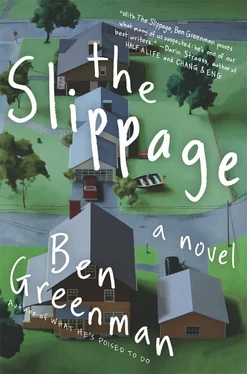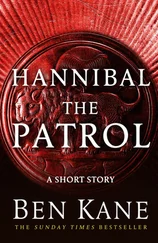“Which ones?”
“Mexico. Egypt. Assorted island nations.” Tom had lived as an itinerant academic for more than a decade, and he kept his past whereabouts frustratingly vague. “All good options for Annika. She’ll be safe from me there.”
“Too bad,” William said. “She seemed nice.”
“And people are always how they seem.” Tom laughed. “If you’re not careful, you’ll end up a philosopher yet.” He smiled thinly, as if he could see what was coming for William and had nothing particularly good to say about it. “It’s probably better that she got gone. This way, I get free. I’m no expert at relationships. Never saw the point of them. They always say ‘a marriage of two equals,’ and it always ends up as an Anschluss. As it turns out, Thomas does not play well with others, and so Thomas does not play with others at all, not for the long run at least. He gets what he can, and then he gets back to work.” The weather had turned when they were inside, and the sky looked like a window with the curtains drawn. “It’s like Horace said: ‘ Aut insanit homo, aut versus facit .’ ‘The man is either insane or he is composing verses.’”
“Why not both?” William said. His voice was filled, suddenly, with a vehemence that surprised him.
As they neared the intersection of Rosten and Sawyer, William noticed a man coming across the park. He was walking funny, wobbling side to side with every step. Then William noticed a second man, then a woman, and then he saw the fingers of thin, dark smoke at the corner of the office building at the far end of the park. Before long, nearly two dozen people were in the park. They were dressed for the workday — the men wore suits, the women dresses — but several were without shoes or had their shirts unbuttoned. One man, tall and reedy, with a receding hairline, came near enough that William and Tom could hear him talking on his telephone. “Fire,” he said, after which he doubled over and began to cough.
William took a bottle of water from the door pocket of the car, hopped out, and rushed to the man. “Here,” he said. The man braced himself and downed the entire bottle of water. “What happened?” William said.
The man jerked a thumb backward. “Started in the electrical closet, I think.” The man worked for an insurance company, Birch Mutual, which shared a broad two-story building with attorneys, a consulting service, home health care, and tax preparers. They’d had dozens of false alarms over the years, the man explained, so many that the employees learned to ignore them. “They usually tell us to wait for an update on the condition, and then they vanish for a few minutes,” the man said. “But this time they came right back on. This time you could hear the fear a little bit.” The man had been in the east wing. “They told us not to move. The west had to evacuate out the front door, but we were told to stay where we were.” So they remained, working, or trying. “We all were looking up to the second floor. Then there was a noise over by the central stairwell, and they all came running downstairs.”
Others leaving the building had gathered around them. Some had sooty faces. All smelled like smoke. A few of them came near William’s car. “Hi there, Fred,” said one man, holding out his hand. Fred didn’t reach out to take it. William was relieved; a handshake would have seemed inappropriate. Someone came from the park house with more water bottles, and they were passed from hand to waiting hand. Tom rolled down the car window to listen.
About five minutes after the first alert, Fred said, the alarm sounded again. A part of the roof had collapsed. “They told us in the drills that that was only a faint possibility,” said the man who had offered his hand.
“They don’t know,” Fred said. “At that point, everyone started grabbing what they wanted to take with them: family photos, cell phones, food.”
Tom came out of the car. “People grab to flee a fire like they grab to flee a flood,” he said. Fred nodded, though William didn’t know if he was agreeing or just acknowledging the idea.
Just then a woman gasped and pointed; the crowd turned, almost in unison. A man was going across the far edge of the meadow — at least William thought it was a man. It was a plume of fire with a dark core, and it was making a noise that was not quite a shriek but not quite a word: a high note, eerily pure. “Andy,” a woman said. The figure lurched forward a few more steps and then collapsed onto the grass. Another man appeared from the building and started hitting at the fire with his coat. “Is it Andy?” another woman said. Paramedics rushed toward the middle of the field like water to a drain.
Louisa’s friend Mary liked to say that there were two kinds of people: those who couldn’t stand to see people fresh from an accident, all busted up, and those who couldn’t stand to see people who were terminal, slowly withering on the inside. Louisa had announced she was the second type and waited expectantly; William said nothing, but they both knew he was the first. A few years earlier, Louisa, who never complained of pain, had felt a stabbing in her belly. Bleeding had followed. The doctor ran tests, and in the days of waiting, as William worried over every terrible possibility, he wanted nothing more than to escape, to get in the car and drive north as fast and far as he could. The tests came back, and the doctor explained what had happened, pointing to pink areas on a chart of the female anatomy. Louisa wept. A pamphlet outlining fertility treatments was pressed into William’s hands by an overeager nurse. On the drive home from the doctor’s office, Louisa stopped crying, and William made his peace with the almost lunar silence that followed.
Now, with the paramedics still on the burning man, William took out his keys and opened the car door. “What?” Tom said. “We’re not leaving, are we?” They could see the burned man’s legs, clothes in shreds, in the gaps between the paramedics. The man moved for a little while on the ground and then stopped moving. Orders were shouted, skin was wrapped, a stretcher procured, the body hoisted. There must have been sirens, but William did not hear them.
The coffee shop, the Bean Counter, was the small dream of a pair of married accountants. They had been fixtures in the place, greeting guests and always finishing each other’s sentences, until something snagged after a year or so and they split up. People now called it Grounds for Divorce, with not a little sadness. William and Tom ordered from a stringy young man with a faint caterpillar of a mustache and carried the cups to a table by the front. A pair of women fake-hugged another pair of women they didn’t seem happy to see. Three five-year-old boys were banging hell by the counter.
“You know what I was thinking about when we were by the fire?” Tom said. William shook his head. “I was thinking about the man who was running across the field.”
“That’s understandable,” William said.
“But not about his pain, or his misfortune, or anything like that. I was thinking about the physics of it.” Tom bent his head, dug a thumb into the hinge of his jaw. It was a gesture William had seen on Louisa. “You know Aristotelian physics? He said that certain elements seek certain locations. It’s in their essential nature. Earth moves toward the center, or down. Fire moves toward the sky, or up. By his reckoning, a man who’s mostly fire would fly away, but that man went down to the earth. I wondered what Aristotle, or someone who believed his philosophy, would have thought as he watched the man go down. He might have wondered, suddenly, if he knew anything at all. But people can’t really entertain that idea, because that’s when the slippage starts.”
Читать дальше












